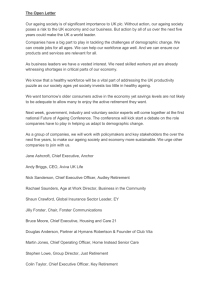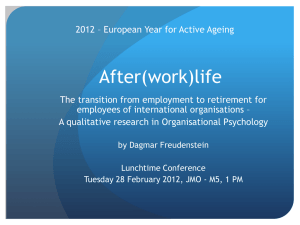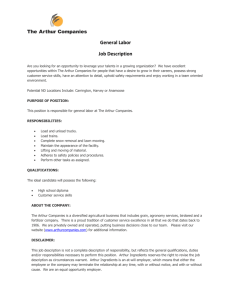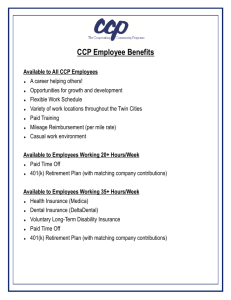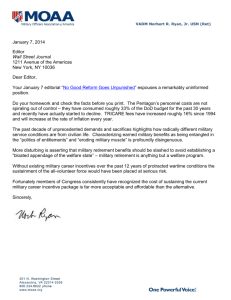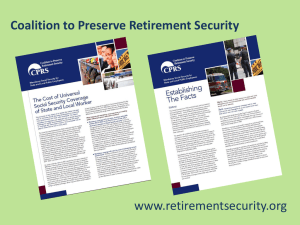September - St John's in the City
advertisement
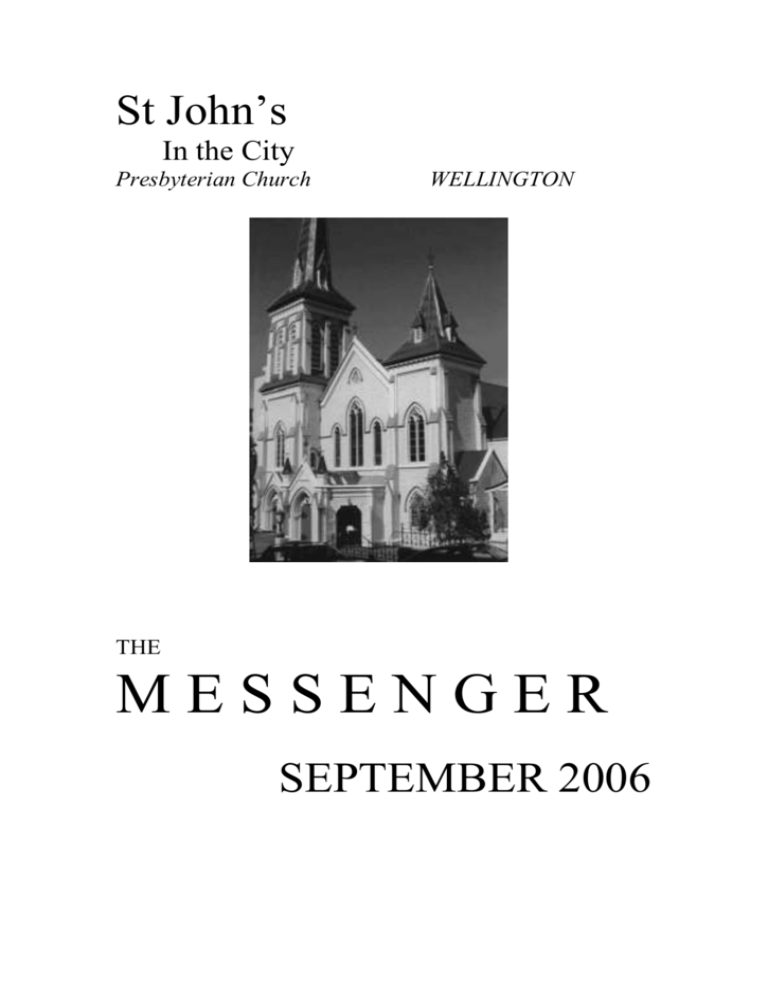
St John’s In the City Presbyterian Church WELLINGTON THE MESSENGER SEPTEMBER 2006 2 THE MESSENGER is published quarterly by corner of Willis and Dixon Streets WELLINGTON P.O. Box 27 148 Phone: (04) 385 1546 Fax: (04) 385 0040 Editor: WYN BEASLEY Production: Barbara Newdick THE MESSENGER welcomes contributions, but can offer no guarantee of publication. Contributions should be forwarded to the Church Office at the numbers above, or by e-mail to: b.newdick@stjohnsinthecity.org.nz Views expressed in THE MESSENGER do not necessarily reflect those of St John’s in the City. 3 CONTENTS INTRODUCTION 4 NEWS Parish events 5 Pastoral committee lunch Photographs by Lynn Pollock 6 Challenge for Change 2006 [second part] Wendy Benge 15 Note on the Holy Communion survey 16 VIEWS THEME: Ageing Seminar: Looking forward to the future with laughter Helen Martin 7 A Nun’s Prayer 14 The Theft of Identity Wyn Beasley 16 Postscript [From As You Like It, Act II] 18 4 INTRODUCTION In my introduction to the June issue I mentioned that the theme of the September issue can already be forecast. Helen has written to me At the end of July we are holding a day of seminars workshops around the general theme of retirement and ageing, and she has booked Messenger space accordingly, to report on a theme that will affect every member of the congregation sooner or later – but some of us, sooner! For this issue she has delivered abundantly on her offer. I hope you will enjoy the varied contributions that relate to the seminar and its theme. My recent experiences have even prompted me to contribute a short essay on one of the hazards of ageing. It is a challenging business, this matter of ageing. Fifty years ago, the word did not even exist as a noun. (It was the present participle of the verb ‘to age’ and was spelt ‘aging’.) Now the preferred spelling in my Concise Oxford has the ‘e’ and allows the noun in its own right, as an ‘action or process’. Well, as I wrote in June, it is something we can all look forward to! But now I want to offer a challenge of my own – to the younger members of the congregation. It has been complained of at times, that there is not much for youth in the Messenger. The reason is simple: not much is offered. It will be a useful counterpoint to all the talk about the old in this issue, if the December issue can be deluged with material from, and about, the young. I look forward to receiving it. 5 WYN BEASLEY PARISH EVENTS BIRTHS Congratulations to Ani and Ryhan Prasad on the birth of Elihu Roy MEMBERSHIP We have been pleased to welcome into membership Kiki Maepu and Marisa Taiutave MARRIAGES Jeremy Bennett to Hannah Wyatt Kiki Maepu to Marisa Taiutave CHANGE OF ADDRESS Sally Robertson is now living at Hazelwood Elderly Care, 31 Bombay St, Ngaio Ph: 479 3108 DEATHS Our condolences to the friends and family of Jack Hetrick, who died in Wellington Hospital after a short illness. 6 Jack and I were Elders together at Roseneath. His contributions to the deliberations of the Kirk Session were always made quietly and were, just as consistently, sound. And who can contribute better? WYN BEASLEY PASTORAL COMMITTEE LUNCHEON Readers may enjoy these photographs taken by Lynn Pollock at the Luncheon on 6 August; some will enjoy seeing themselves! ABOVE: Breaking the ice BELOW: Breaking the fast 7 LOOKING FORWARD TO THE FUTURE WITH LAUGHTER As an old friend used to say to his class of university students, ‘Speak up if you want me to hear you. I’m a little hard of hearing and, if you are lucky enough, one day you’ll be just like me!’ Growing older need not be cause for gloom: as Leunig the cartoonist has it: Our seminar on Saturday 29 July was a day of information, fun, laughter and fellowship of the best kind. There were about 70 of us rustling in our goodies bags, asking questions about living wills or family trusts, doing fun exercises, sampling smoothies, 8 Doing fun exercises trying out one of the chairs on display, or just sitting listening or chatting. We thoroughly enjoyed ourselves, and the Pastoral Committee thank each participant and every helper who made the day such a success. Such were the positive feelings and feedback that we may repeat something like it next winter. But in case we don’t repeat it, and for those of you who were not able to join us on the 29th, we offer you some of the treasures from the day. There were many. This is just a small sample: ACC and how to prevent falls in the home: We were all given a large format ACC booklet that contains a fantastic home safety checklist. It also offers commonsense suggestions about lighting, installation of handrails, and keeping walkways safe and free of clutter. Here is one helpful extract: “Getting up by yourself: It might be a long time since you tried getting down on the floor and back up again. It’s a good idea to practise so you’re confident about getting up by yourself. Wait until someone is with you. 9 “We don’t stop playing because we grow old. We grow old because we stop playing.” George Bernard Shaw An active mind is a healthy mind Many of us play Bridge or do the Dompost puzzles every day. But did you know that eating the right kind of food may also help prevent dementia? Each participant of the seminar was given the July issue of the magazine “Healthy Food” (find it in the magazine section of any supermarket or bookshop or phone the office for one of the copies we have left over from the seminar). Here is an extract from one of the articles: “There is no cure for the disease [dementia] but there are treatments other than medication that can slow down the symptoms. These treatments include nutritional supplementation, with adequate fluid intake, and increased consumption of fish, antioxidants such as vitamins E, C and A and polyphenol, which is found in red wine, and B vitamins, including B6, folate, and B12. 10 In addition, it is important to include all recommended nutrients in the diet. Reduced intakes in total energy, total protein, carbohydrates, fats and micronutrients including vitamins and minerals have also been found to contribute to faster progression of symptoms. Here are some useful guidelines: * Enjoy a wide variety of nutritious foods. * Keep active to maintain muscle strength and a healthy body weight. * Eat at least three meals every day. * Care for your food: prepare and store it correctly * Eat plenty of fresh vegetables (including legumes) and fruit * Eat plenty of cereals, breads and pastas * Eat a diet low in saturated fat * Drink adequate amounts of water and/or other liquids * If you drink alcohol, limit your intake * Choose foods low in salt and use salt sparingly * Include calcium-rich foods * Use added sugars in moderation.” One of our speakers was Janet Turnbull, a consultant geriatrician who works at Kenepuru Hospital. Everything she said confirmed all of the above, with one exception and one addition. The exception was her caution about vitamin supplements. These are to be taken with care, and our good healthy diet of real food is more important than supplements. In addition she emphasised the dangers of smoking and the importance of giving up. Most of us don’t smoke, but if we do . . . give it up! Get your friends to give it up too. Our ongoing health depends on it. Thought of moving house and baulked at the impossibility? Rob Ewan intrigued us with stories about the difficulties people have when they try to move from their family home into something smaller. We grimaced as he voiced anxiety about some of the difficult accesses we have. We smiled wryly as he recounted the inappropriate need to have large storage areas 11 when we are getting older. He didn’t actually say it, but he might as well have: “De-clutter and simplify” so that when you decide to “down size” you are in control of the process. Many of us identified with Rob’s stories. He was talking about me! And you! I am giving lots of my books to the DCM Bookfair. That will at least get me started! “No-one can avoid ageing, but ageing productively is something else.” Katharine Graham Don’t despair! If you need help to know where to get started with the truly awful business of moving house, do give your elder a call or our Pastoral Worker, Allie Crombie. We are always happy to refer you to appropriate agencies, services and people. How do you know who might help with what? One of the very helpful ‘freebies’ from our seminar on ‘Looking forward to the Future’ is a booklet: ‘Useful information to assist with ageing.’ It lists a wide range of helping agencies and their contact details. If you would like a copy of this, phone the St John’s Office (385 1546) and we will happily provide you with one while our stocks last. In it you will find contact details to help with: Emergencies, advice and information, Age Concern, Citizens Advice Bureau, Legal enquiries and advice, Wills, Powers of Attorney, Work and Income NZ, Inland Revenue Dept, ACC, Financial Planning, Health information, Transport assistance, Security, Home deliveries, Disability equipment, Specialised group assistance, Groups and organizations, Counselling and welfare support, Private nursing / home care, Retirement villages and homes, Day care, Drop-in centres, Social activities and Community centres. Know your facts, do your homework, don’t get caught out! Many of us are a little wary of retirement villages. Don’t they gobble up money? Aren’t there some sad stories about people’s 12 unwise investments? The New Zealand Retirement Guide has a range of articles to help us steer our way through the Retirement Village choice and many other decisions. It also quotes the Retirement Commissioner: “We have launched new information on our popular website www.sorted.org.nz as part of our 60plus. This new retirement villages section has checklists and detailed information for people thinking about buying into a retirement village. This straight forward information covers the financial, legal, personal and lifestyle factors people need to consider,” says Ms Crossan. The new Retirement Villages Act 2003 protects people entering and living in retirement villages, and it is to come fully into force in the coming year. . . for any questions or issues residents or intending residents should first contact the village manager. The village statutory supervisor and residents’ committee are also ways to get assistance. For updates on the implementation of the Act people can visit the Retirement Commission’s website www.retirement.org.nz for a Guide to the Act and a list of useful contacts.” We have 20 spare copies of The New Zealand Retirement Guide. Phone the church office and ask for your free copy. 13 A sometimes necessary decision: Residential care can become a reality when the daily care of a parent or a spouse becomes too much for the one doing the caring. On one of the stalls in our Expo there was a paper titled: “Time to share the care: making the decision to enter residential care.” This article addresses the carers’ needs and explores ways in which the carer can be assisted in decisionmaking during a difficult transition. It is an excellent resource for all ‘baby boomers’ as they accompany relatives through the ageing process. A few quotations: “Having a spouse or parent enter full time care is a form of loss. Like other losses, it is a time of transition and change . . . it is a bereavement with a difference . . . the sense of failure that this may generate . . . having to concede defeat . . . loss of a role, loss of purpose, loss of a sense of achievement, and possibly loss of economic security . . .” As we were planning the seminar on looking forward to the future I was given this version of Psalm 23. Enjoy! “The Lord is my Shepherd – that’s relationship! I shall not want – that’s supply! He maketh me to lie down in green pastures – that’s rest! 14 He restoreth my soul – that’s healing! He leadeth me beside the still waters – that’s refreshment! He leadeth me in the paths of righteousness – that’s guidance! For his name’s sake – that’s purpose! Yea, though I walk through the valley of the shadow of death – that’s testing! I will fear no evil – that’s protection! For thou art with me – that’s faithfulness! Thy rod and thy staff they comfort me – that’s discipline! Thou preparest a table before me in the presence of mine enemies – that’s hope! Thou anointest my head with oil – that’s consecration! My cup runneth over – that’s abundance! Surely goodness and mercy shall follow me all the days of my life – that’s blessing! And I will dwell in the house of the Lord – that’s security! Forever – that’s eternity!” Looking forward to the future As we all look forward to the future, whether it be long or short, what is most valuable, is not what we have in our lives, but who we have in our lives. HELEN MARTIN ___________________________________________________ The theme of this prayer commended itself to Helen as fitting in well with the theme of the recent seminar. 15 16 [second part] In the June issue Wendy Benge wrote of attending a gathering for the presentation of certificates to successful participants in the 20-week course. B.G.I. Challenge for Change coordinator Jacinta Krefft told us not only of the change in the young people who had fronted up to the challenge: she spoke also of the change in the trained mentors themselves as a result of their engagement in this operation. They had seen a wide range of carefully focused activities bring out clear evidence of endurance, loyalty, discipline and application in their protégés. Inspired by this result one mentor had decide to train as a teacher, another had left a government job to do youth development work, while a forty-year old banker who had been mentor on two programmes had decided to go back to university to study counselling. So the Challenge for Change project seems to be not merely one-sided. In doing this voluntary work there are mentors who have discovered new interests and gifts, new skills and a new sense of purposeful orientation. The thirteen recipients of certificates spoke to the audience briefly, but specifically of what they had gained from the course, and their mentors spoke of their deep satisfaction at the new approach to life which they had seen their protégés achieve. At least one mentor declared, ‘I will continue to see my mentee regularly.’ Another said, according to the Cook Strait News, that ‘mentoring is one of the best things she has ever done’. The final touch was seeing the parent[s] of the young ‘mentees’ accompany their child on stage, clearly proud of his/her achievement. For information on mentoring see Ross Davis or call Jacinta Krefft on 385 9549. WENDY BENGE ___________________________________________________ NOTE 17 Enclosed with this copy of the Messenger is a questionnaire concerning the frequency of celebration of Holy Communion. Readers are asked to study and fill in this survey. ___________________________________________________ THE THEFT OF IDENTITY My father was given one Christian name: he was Arthur Beasley. He was called Arthur, even Art; or Mr Beasley, or The Head (he was a schoolmaster whose pupils remained loyal and attentive to him fifty years on). But the name ‘Arthur Beasley’ was specific to him over the nine decades of his life. 18 I was baptised with the names ‘Arthur’ (obviously that had to be part of it) and ‘Wynyard’ (which my mother liked, and which probably derived somehow from the early lieutenantgovernor) and – not least because people find it hard to assemble the two ‘y’s, especially in the right order – I was known as ‘Wyn’. Not that this helped altogether: people spell the abbreviated form [as Win, Wynn, Wynne and the like] more often wrong than right; but at least in the spoken form it belonged to me. Then a few years ago the telephone calls began. ‘Can I speak to Arthur?’ I soon learned that such callers wished to sell me real estate, or insurance, or wine. Depending on my level of forbearance I would reply: ‘Go ahead’ or ‘What do you want?’ or (on a trying day) simply ‘No’. For, in my mental directory, ‘Arthur’ was my father, now deceased, and I am ‘Wyn’. Next, mail often unsolicited [polite name for ‘junk mail’] but gradually also from organisations that ought to have known better, came to address me as ‘Arthur’ – that practice probably emanated from the Harvard Business School which works on the bases that ‘People are statistics’ and ‘Management is science’ and is responsible for many of the ills and inefficiencies of the world today. And, most recently, I had a few days in hospital, where my wrist band identified me as ‘Arthur Beasley’ and various members of the hospital staff chose to address me as ‘Arthur’ rather than using my surname. Now this began to eat into my sense of identity: there is nothing more off-putting than being woken up in the middle of the night and asked ‘Are you all right, Arthur?’ But the most resolute offender was the woman who was taking off a blood sample: she attached the name to every sentence she spoke, until I pleaded, ‘Actually, I answer to ‘Wyn’.’ Her response was instantaneous: ‘Thank you, Arthur: now hold out your arm and make a fist.’ Make a fist! I ask you. In the morning paper as I write this, there is an article on the discrimination to which left-handers are subject. I have come to recognise just what discrimination ‘second-namers’ 19 have to confront, and this has helped me appreciate an even more sinister form of usage. I refer, of course, to the practice by which everyone is supposed to be on first-name terms, and I begin to understand the practice that strips residents of retirement homes of their identity. For a juvenile staff member of such a home to address a resident as ‘Lucy’ when that resident has, throughout her adult life, been addressed as ‘Mrs Bloggs’ or – by young people the age of the staff member, in her own family – as ‘Grandma’, is to rob her of her identity. And she knows that, once her identity is stolen, she will never get it back. And, as I have come to appreciate, identity is a precious thing. WYN BEASLEY POSTSCRIPT In the second act of As You Like It, the exiled Duke Senior muses on the state of the world. His loyal courtier Jaques (known to his colleagues as ‘the melancholy Jaques’) is prompted to muse in turn, on the ageing process. Shakespeare’s genius transmutes Jaques’ pessimism into what is arguably the best known analysis of growing up and growing old. Duke S. This wide and universal theatre Presents more woful pageants than the scene Wherein we play in. Jaq. All the world’s a stage And all the men and women merely players: They have their exits and their entrances; And one man in his time plays many parts, His acts being seven ages. At first the infant, Mewling and puking in the nurse’s arms. And then the whining school-boy, with his satchel, And shining morning face, creeping like snail Unwillingly to school. And then the lover, 20 Sighing like furnace, with a woeful ballad Made to his mistress’ eyebrow. Then a soldier, Full of strange oaths, and bearded like the pard, Jealous in honour, sudden and quick in quarrel, Seeking the bubble reputation Even in the cannon’s mouth. And then the justice, In fair round belly with good capon lin’d, With eyes severe, and beard of formal cut, Full of wise saws and modern instances; And so he plays his part. The sixth age shifts Into the lean and slipper’d pantaloon, With spectacles on nose and pouch on side, His youthful hose well sav’d, a world too wide For his shrunk shank; and his big manly voice, Turning again toward childish treble, pipes And whistles in his sound. Last scene of all, That ends this strange eventful history, Is second childishness and mere oblivion, Sans teeth, sans eyes, sans taste, sans everything. See how bleak the process becomes without laughter, and the title of the recent seminar takes on a new significance . 21 22 CALENDAR OF EVENTS Church Parade for The Boys’ and The Girls’ Brigades Sunday 10 September Quarterly Communion followed by a shared lunch Sunday 24 September 7pm Youth Service 28 September – 2 October General Assembly of PCANZ Auckland Saturday 14 October 5.30pm Annual General Meeting and pot-luck tea Sunday 19 November All Age worship Tuesday 28 November 11.30am Women’s Association Christmas Service Sunday 3 December 10am Carol Service 7pm Scots College Carol Service Sunday 3 September 10am
